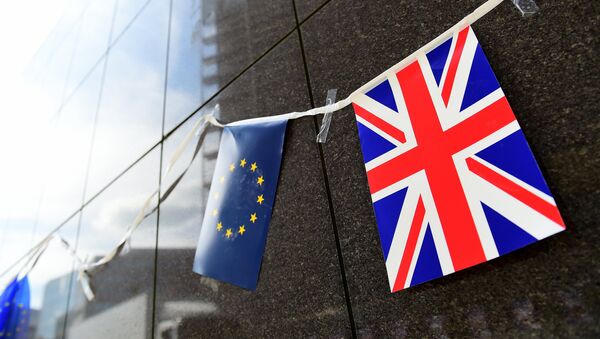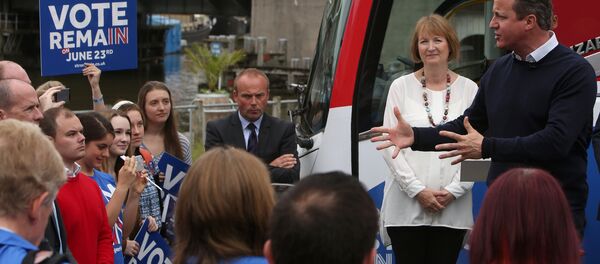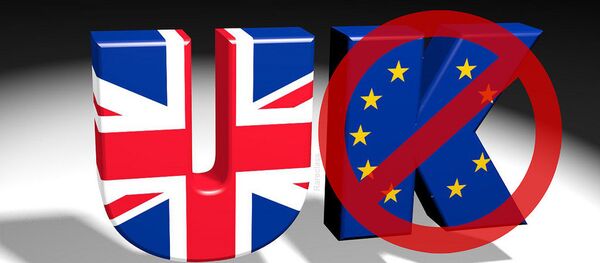MOSCOW (Sputnik) — In 1957, the European Economic Community (EEC) was set up. At a time, it had six member states: Belgium, Italy, Luxembourg, the Netherlands, the Federative Republic of Germany (FRG) and France. The idea was to create a common economic space by boosting economic development in the EEC member states.
The United Kingdom stood away as it was skeptical of the EEC’s trade and economic prospects. Back then, the UK authorities and business circles were staking on broader ties with the United States and the Commonwealth countries.
The United Kingdom applied for EEC membership twice, in 1962 and 1967. However, both bids were blocked by France. Then French President Charles de Gaulle feared that the United Kingdom, given its special ties with the United States, would play a negative role in the EEC, undermining its solidarity and independence in relations with the United States. It was only in 1969, soon after de Gaulle stepped down, that the accession talks with the United Kingdom began.
In 1972, the United Kingdom walked out of the EFTA and as of January 1, 1973, became an EEC member state. From its very first years in the EEC, which was renamed the European Union in November 1993, the United Kingdom sought to maintain maximum independence in key economic and political issues. Thus, it did not support major integration projects such as the 1995 Schengen Agreement on visa-free borders inside the European Union and the 1999 introduction of the European common currency – the euro.
At the EU summit in March 2012, London rejected the budget pact on tighter financial discipline, lobbied by Berlin and Paris. The United Kingdom’s share in the EU budget is around 11.3 billion euros ($12.7 billion) per year.
Statements by UK officials and documents adopted by the ruling party in recent years often called for a reshuffle of authority between London and Brussels. The UK Conservative party threatened to pull out of the EU Charter of Fundamental Rights, restrict the jurisdiction of the European Court, revise the EU employment laws, cancel the 48-hour working week, reform the common agricultural policy, which accounts for 40 percent of the EU budget, and so on.
In 2011, an economic crisis in the United Kingdom boosted the anti-EU sentiments. Conservative lawmaker David Nuttall urged a referendum on the country’s membership in the European Union. His petition collected more than 100,000 signatures. Despite that, on October 25, 2011, UK lawmakers, after five hours of debates, voted by an overwhelming majority of 483 votes out of 650 against the plebiscite.
Addressing the UK Parliament on that day, Prime Minister David Cameron asked the lawmakers to vote against, saying that with crisis gripping Europe, it was not the best time for such a referendum.
The election took place on May 7, 2015. The Conservatives took 36.9 percent of the vote, compared with 30.4 percent won by the Labor Party, and secured an absolute majority in the House of Commons, the lower house of Parliament. Conservative leader David Cameron formed a one-party government.
On May 28, 2015, the UK government motioned a bill on a referendum on the issue of the United Kingdom’s pullout from the European Union. The question was worded as follows: "Should the United Kingdom remain a member of the European Union or leave the European Union?" The vote was to be held "no later than December 31, 2017."
In June 2015, the House of Commons approved the bill.
On November 10, 2015, Prime Minister David Cameron launched an official campaign to alter the terms of the United Kingdom’s EU membership. In his letter to the European Council, he spelled out London’s demands.
The demands were split into four groups.
The first group comprised demands to cut migration flows from the European Union to the United Kingdom. It included a four-year suspension of social allowances to migrants, a six-month ban on unemployment allowances to migrants from the European Union and tighter deportation rules for migrants who commit offenses.
The third group aimed to bolster UK sovereignty, including by renouncing the commitment to move toward the "ever closer union" as stipulated by the Treaty on the European Union.
And finally, the last group, comprised demands to amend currency laws such as the inadmissibility of discrimination against countries that are not part of the monetary union, or the Eurozone or attempts by Eurozone countries to impose any decisions on their non-Eurozone partners, the creation of a banking union exclusively on a voluntary basis, and so on.
Cameron vowed to call a referendum if those demands were not satisfied.
After the demands were submitted in November, the European Council and the European Commission began intensive talks with London to discuss details of a possible deal.
On February 19, 2016, the EU leaders, after two days of debates, reportedly agreed on the new membership terms for the United Kingdom on which Prime Minister Cameron would support his country’s stay in the European Union at the upcoming referendum.
Yielding to London’s pressure, Brussels also approved a norm allowing national parliaments to initiate the suspension of hearings of bills by the European Council if it is proven that they breach the principle of the delegation of authority in the European Union.
The EU member states asked the European Commission to draft legislative amendments meeting the United Kingdom’s demands to cut children’s allowance to migrants whose children live outside the country that pays the allowance.
The European Commission also pledged to amend the law on the free movement of workforce within the European Union to satisfy the most problematic of London’s demands, namely to freeze social payments to migrants from EU member states if the burden of these payments on the UK welfare system is excessively high.
Member states that do not take part in deepening the monetary union should not obstruct, but on the contrary, should promote those efforts. Anti-crisis measures aimed at propping up financial stability in the Eurozone will not affect the budgets of those EU members that do not use the euro or do not participate in the EU banking union. The latter applies both to Eurozone countries and EU member states wishing to participate in it.
Moreover, any EU member state can raise issues pertaining to the implementation of this decision at EU summits.
The United Kingdom’s EU membership referendum will be held on June 23. Prime Minister David Cameron has ruled out a second EU membership referendum. The issue will not be revised, he said.








